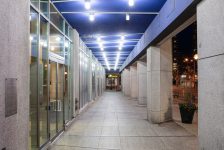The Infinity Condominiums were built in the heart of the city, a place steeped in symbolic memories of the growth of Toronto. It proposes a subtle, but meaningful, public art installation through strategic interventions in the gap between art and architecture. Both artist and architects collaborated on this work to explore the themes, divisions, and similarities between art and architecture. This work features three depths of field which the artist uses to play with the eyes of the audience, the pavements of the walkways, the ceilings of the walkways and the columns that face towards the street. The non-parallel lines in these three depths is designed to arrest the audience and confront them with the seemingly unnaturally asymmetrical lines of the piece, challenging notions of uniformity and rigid aesthetics.

Infinity

Margaret Priest
b.1944
- Steel, zinc, sandblasted granite, concrete, terrazzo, LED lighting and neon tubing
- 2003 (completed in 2008)
- 45 m x 2.2 m x 3 m
- 30 Grand Trunk Crescent, Toronto
About the artwork
About the artist
Margaret Priest was born in 1944 in Tyringham, England) and was raised and educated in London, where she received her MFA from the Royal College of Art. She moved to Toronto in 1976. Known for her drawings and three-dimensional critiques of modernism and the built world, Priest works at the intersections of architecture, design, urban histories and personal memory. Since 1970, she has exhibited in museums and public and private galleries in England, Europe, Canada, Australia, South Africa, and the USA. Though retired from teaching, she is Professor Emeritus at the University of Guelph and a visiting lecturer at universities and schools of art and architecture in Canada and the USA.
Fun facts
- Priest’s work generally raises the issues of gender and social class, playing a critical role in her approach and thinking.
- While collaborating with artist Fraser Stables, the City of Toronto commissioned through the City of Toronto Percent for Public Art Program, recreating a travel path across the site from pre-contact to the railway tracks of the 19th and 20th century.
Engagement questions
- How does the composition of this work make you feel?
- What do you think the artist wanted to communicate and why?
